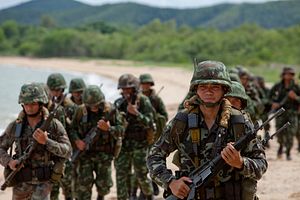Last week, a formal announcement was disclosed about a potential new military vehicle deal between the United States and Thailand. The development put the spotlight on the ongoing efforts by both countries to continue to further their defense collaboration within the broader relationship.
As I have noted before, the United States and Thailand, which are treaty allies, have a range of engagements in the defense side of their relationship. This includes not only bilateral components that are usual in relationships such as visits, exchanges, and arms sales, but also multilateral exercises such as Cobra Gold and periodic access for the U.S. military during regional contingencies.
Despite some shifts in recent years, including Thailand’s navigation of its post-May 2014 coup environment and the election of U.S. President Donald Trump, both countries have attempted to continue to accelerate the security aspect of their relationship. That has continued on into 2019 as well in the midst of wider developments, including U.S. efforts to develop the defense component of its free and open Indo-Pacific vision and Thailand’s chairmanship of the Association of Southeast Asian Nations (ASEAN).
One of the developments that had been in the headlines in this respect was Thailand’s purchase of Stryker infantry carrier vehicles. For instance, back in May, the Royal Thai Army had announced an intent to purchase 60 Strykers produced by General Dynamics Land Systems along with supporting equipment, with the first batch arriving by the end of the year. At the time, the announcement was portrayed as being a significant development, particularly amid concerns that Thailand was increasingly also purchasing more defense equipment from China.
Last week, the deal took another step forward with the formal announcement of the approval of another possible foreign military sale (FMS) to Thailand for Stryker infantry carrier vehicles. Per the Defense Security Cooperation Agency (DSCA) in a release issued on July 26, the State Department had made a determination approving the FMS for 60 Strykers for an estimated cost of $175 million.
According to the DCSA press release, the Thai government request covers 60 Stryker ICVs, 60 M2 Flex .50 cal machine guns, as well as spare parts, and other supporting equipment including those for testing, operations, maintenance, logistics, and program support.
While the deal itself comes as no surprise given previous headlines in this respect, specifics still remain unclear, including the delivery date and how the Thai military plans to utilize them. Previous reports had suggested that initial deliveries would be seen as early as late 2019, with the Strykers expected to be sent to the 11th Infantry Division, which is based in Chachoengsao.

































